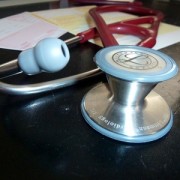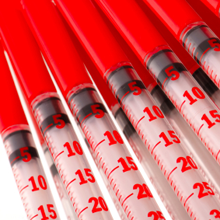
Len Tooley (© Len Tooley)
Len Tooley is a 31-year-old, sexually active, HIV-negative gay man from Toronto, where he works in the areas of health promotion and HIV prevention for gay men. To help him stay HIV-negative, his GP prescribed him the HIV drug Truvada for pre-exposure prophylaxis (PrEP). In the second part of his interview with John McCullagh from the Canadian HIV portal PositiveLite.com Len reports on his conversations with the doctor, his experiences with taking Truvada daily and his thoughts on health insurance funding for PrEP.
(Original: Len Tooley on PrEP Part Two, 20.2.2013; Many thanks to John and Len for the permission to publish the interview here!)
Len, in the first part of our interview you mentioned that PrEP is authorised in the USA. Canada has not yet followed suit, but some doctors in our country still prescribe the HIV medication "off-label", i.e. outside of the actual authorisation, for this purpose. Was it easy to convince your GP to prescribe PrEP for you?
To be honest, I was in a special situation: firstly, I have a family doctor, which many others can't say about themselves. And secondly, he is not only gay himself, but also has a lot of HIV-positive patients. I was lucky that I have been working in the HIV field for a long time and got to know this doctor through friends. Of course, my doctor already knew about PrEP, so I didn't have to tell him about the research findings on its effectiveness.
I was lucky: my job keeps me well informed
Part of my job is to be informed about the research and also the practice of PrEP, and since I had already read a lot about all possible aspects of PrEP, I pretty much knew what to expect. I was prepared for the questions he might ask me and knew that I was a suitable candidate for PrEP.
What questions did your doctor ask you?
It took me a total of four appointments with him to get the prescription. When I mentioned this the first time, he told me that we should first have a detailed discussion about what goes through my mind when I don't use condoms. I replied that I wished the whole thing was that simple (after all, I'm an HIV preventionist), but that it wasn't always a yes-no decision. He could be sure that I was doing my best to have safer sex, but I didn't always succeed.

At the second appointment, when I was seeing him about something else, I brought the conversation back to PrEP. He hesitated a little at first and then told me that if he was to prescribe PrEP for me, I would first have to have blood tests so that he could check my kidney and liver function and also be sure that I was still HIV-negative. Once the results were available, we could talk about it further. I agreed, he wrote me a referral and I went to a laboratory the same day and had the blood tests done.
When the results were available, I made another appointment with my doctor. He confirmed that I was HIV-negative and that my kidney and liver function tests were OK. I was quite nervous and excited. He asked me what I would do if I had any side effects from the drug. My answer was that only about five per cent of people in the trials had side effects, so the likelihood was rather low, but that if I had any and they didn't go away, I would think about stopping PrEP. I also told him that I knew there could be long-term side effects, but it was probably better for me to take Truvada for as long as I felt I was at risk of HIV than to become infected and then have to take medication for the rest of my life.
And was your doctor satisfied with these answers?
Obviously yes, because he sat down at his computer, pressed a few keys and then the printer buzzed. He took out my prescription, gave it to me and reminded me that I should still use condoms, even if I was taking PrEP.
When did you start the Truvada-PrEP?
One day before my winter holiday, in mid-December. I wanted to do this so that I could react to possible side effects in a relaxed manner.
And have you had any side effects?
No, not at all. In any case, I didn't notice any. I was so prepared for side effects that I even convinced myself I had some: I mistakenly thought that Truvada could cause vivid dreams, and when I had a few intense dreams shortly after starting PrEP, I thought that was a side effect. I later realised that Truvada doesn't cause vivid dreams at all and the whole thing was a coincidence. So I thought I had side effects because I somehow believed that there had to be some.
I had no side effects, but I imagined some
I have to go to the lab soon for another blood test so my doctor can check my liver and kidney function, so I can't say anything about any invisible side effects yet. But I definitely feel great.
Good to hear, Len. The HIV drugs we have today are also much better tolerated than the previous generations of drugs. But PrEP isn't just about swallowing a pill every day, is it?
Yes and no. To be honest, swallowing a pill every day is not as easy as it sounds. For PrEP to work as effectively as possible, you not only have to take it every day, but also at exactly the same time every day. Otherwise the blood levels of the medication can fluctuate too much and your risk of HIV infection increases. This means that whatever I'm doing, whether I'm in a meeting, sitting at the computer, cycling or anything else, I have to have my pill with me every day and remember to take it. I recently had a situation like this when I realised at work that I had forgotten my pill at home. It was really stressful and I cycled home as quickly as I could so that I could take my pill.
Yes, I've also experienced panic moments like that when I've left the house in the morning without my tablets. It's actually not as easy as some people think. You also have to have your blood tested regularly, don't you?
Yes, every three months I have to have the function of my liver and kidneys and my HIV status checked to see if I am still negative.

Why do you always have to take HIV tests even though you are taking HIV medication to protect yourself from infection?
If I were to become infected with HIV while taking PrEP, which I don't think is very likely, the virus could very quickly become resistant to the two substances in Truvada and then I would no longer be able to use these substances in my treatment. Regular HIV tests are therefore important to prevent this from happening.
What's more, a month's supply of Truvada is quite expensive.
You said it, Truvada is Expensive, very expensive in fact. My eyes almost popped out of my head when I saw that the tablets cost 871.21 dollars for one month (equivalent to around 650 euros, the ed.). I am very, very glad that I have health insurance that pays for it. If that wasn't the case, I wouldn't be able to afford the medication.
How do you feel when you think about the monthly cost of Truvada and the fact that your health insurance pays for it all?
I've been thinking about this question for a long time. Am I worth 871.21 dollars a month? Or rather, is it worth $871.21 a month for me to stay HIV-negative? What does it mean to put a price on peace of mind and long-term health? I struggled with myself for a long time, but there are a few reasons why I decided it was worth it.
It is more favourable for everyone if I remain HIV-negative
First and foremost, there is the basic principle of solidarity. Everyone pays something into a large pot, regardless of their state of health, so that those who need medication can get it. I had already been paying contributions for a long time so that I would be reimbursed for the medication I needed if the worst came to the worst. And my doctor and I were both of the opinion that this medication, Truvada, was important to protect my health. That's what health insurance is for. Others take medication to prevent complications from arteriosclerosis, the consequences of high cholesterol levels or high blood pressure, or to prevent heartburn. And the list goes on and on. I didn't get the feeling that avoiding HIV infection was all that different.
And my second realisation was that no matter how you look at it, it's ultimately better for everyone if I stay HIV-negative than if I get infected with HIV. Truvada is a single drug (a fixed combination of two anti-HIV substances), and that's it. If I were to become infected, I would have to take at least one more HIV medication. And that often starts a chain reaction with other medications or vitamin supplements to support general health. So I felt that the cost of PrEP for everyone (including me) more than outweighed the long term cost of contracting HIV.
The first part of the interview can be found here.









